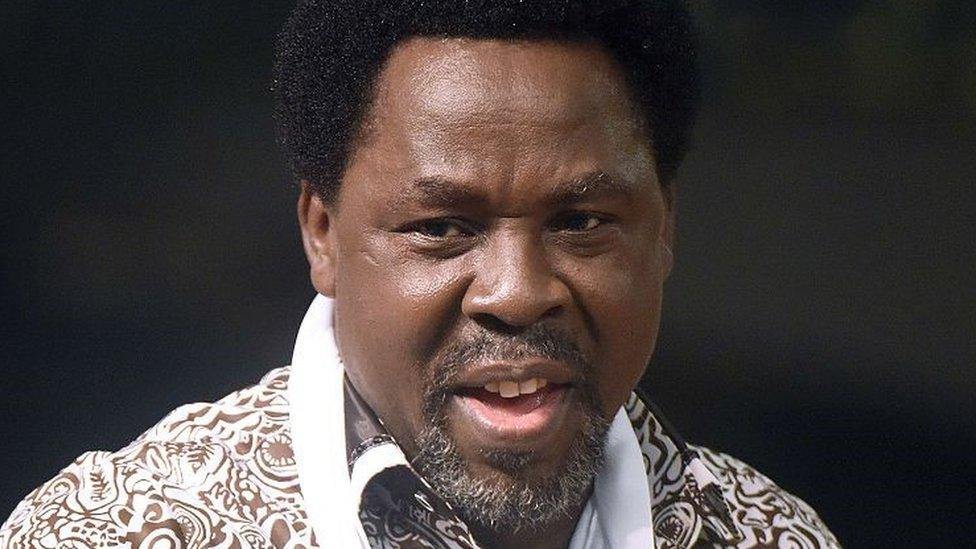TB Joshua: ‘We thought it was heaven but then terrible things happened’
- Published
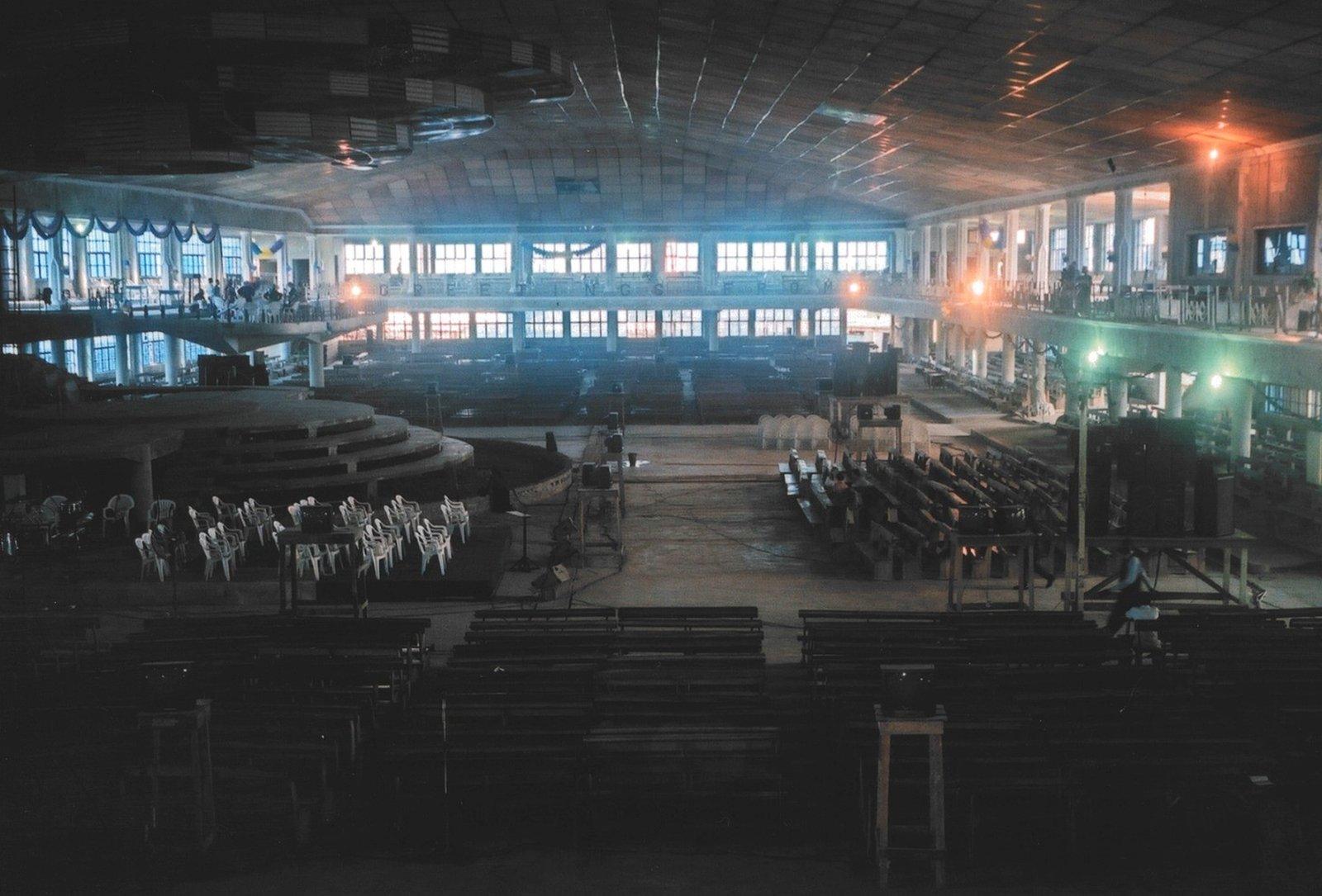
Inside Synagogue Church of all Nations in Lagos, founded by TB Joshua
TB Joshua, a charismatic Nigerian leader of one of the world's biggest evangelical churches, secretly committed sexual crimes on a mass scale, a BBC investigation spanning three continents has found. Testimony from dozens of survivors suggests Joshua was abusing and raping young women from around the world several times a week for nearly 20 years.

Warning: Contains accounts of torture, rape and self-harm
In early 2002, in the depths of a grey English winter, 21-year-old Rae disappeared.
The last time many of her friends saw her was at university in Brighton. She had been studying graphic design, living in a shared house 25 minutes from the sea. Rae was bright and popular.
"For me, it was like she died, but I couldn't grieve her," says Carla, Rae's best friend at the time.
Carla knew where Rae had gone. But the truth of it was hard to explain to their friends. A few weeks previously, she and Rae had travelled to Nigeria together, in search of a mysterious man who could seemingly heal people with his hands. He was a Christian pastor, with a black beard, in white robes. His name was TB Joshua. His followers called him "The Prophet".
Rae and Carla planned to visit his church, the Synagogue Church of All Nations [Scoan], for just one week. But Rae never came home. She had moved into Joshua's compound.
"I left her there," says Carla, tears flowing freely. "Never will I ever forgive myself for that."
The church looms like a gothic temple over the Ikotun neighbourhood in Lagos, Africa's largest city. Joshua designed all 12 storeys of the compound adjoining it, where he lived alongside many of his followers. He oversaw the construction of the multiple staircases to his bedroom. The three doors to it, in and out. The hidden prayer room full of tiny mirrors. The "clinic" downstairs.
We have interviewed many people who lived inside. They paint a picture of a concrete labyrinth; a nightmarish world where reality slipped away and horrors unfolded.
Numerous women say they were sexually assaulted by Joshua, with a number claiming they were repeatedly raped behind closed doors. Some say they were forced to have abortions after becoming pregnant.
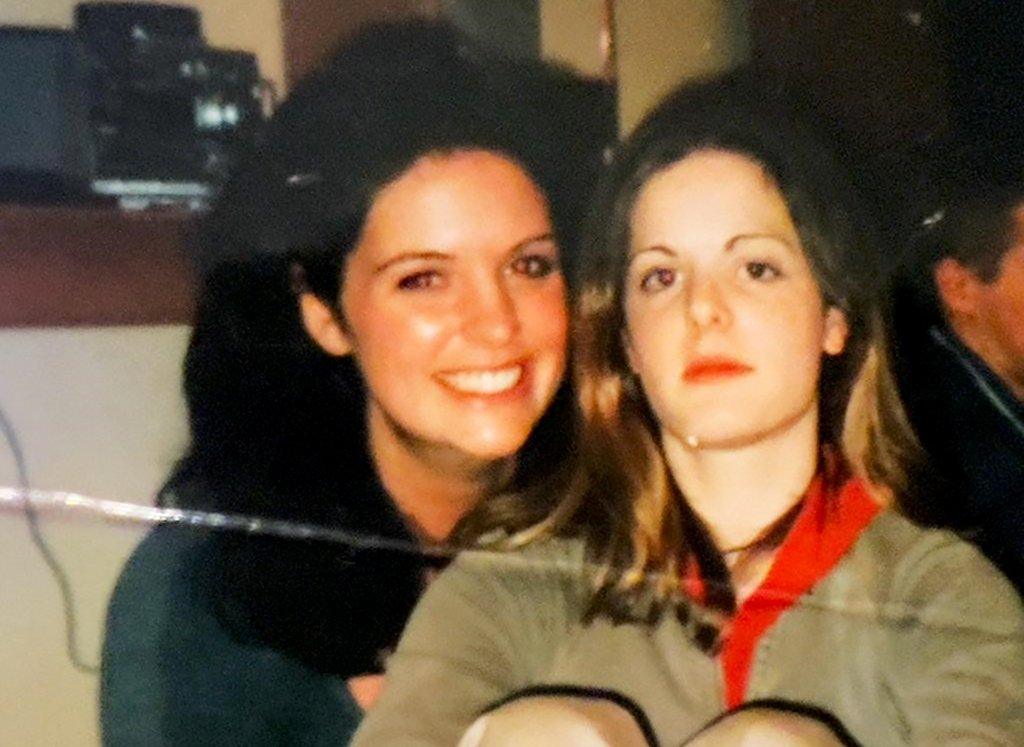
Carla (left) with Rae - she says she is devastated that she came home without her best friend
Today, Rae is back in England, living in a beautiful hamlet in the countryside. She's smiley and laughs freely, but there's something restless about her.
"On the outside I look normal, but I'm not," she says.
When Rae talks about her years in Lagos, her lips tighten. She talks breathlessly. At times, the colour visibly drains from her face. She spent 12 years inside Joshua's compound.
"This story is like a horror story. It's like something you watch in fiction, but it's true."
The two-year investigation, in collaboration with international media platform openDemocracy, has involved more than 15 BBC journalists across three continents. They gathered archive video recordings, documents, and hundreds of hours of interviews to corroborate Rae's testimony and uncover further harrowing stories. More than 25 eyewitnesses and alleged victims, from the UK, Nigeria, Ghana, US, South Africa and Germany, have provided accounts of what it was like inside Joshua's compound, with the most recent experiences in 2019.

More on TB Joshua and allegations

The Synagogue Church of All Nations did not respond to the allegations, but said previous claims have been unfounded.
Former followers have previously tried to speak out about abuse, but say they have been silenced or discredited by Scoan, and two say they were physically assaulted. When the BBC's Africa Eye was filming outside the church, a security guard shot above the heads of the crew after they refused to hand over their material.
Many of our interviewees have waived their legal right to anonymity, in most cases asking just their surnames be omitted. Others asked that their identities remain hidden for fear of reprisals.
The man at the heart of Scoan is regarded as one of the most influential pastors in African history. He died, unexpectedly, in June 2021, just days after many of our first interviews were recorded. On the day of his funeral, Lagos ground to a halt as mourning crowds packed the streets.
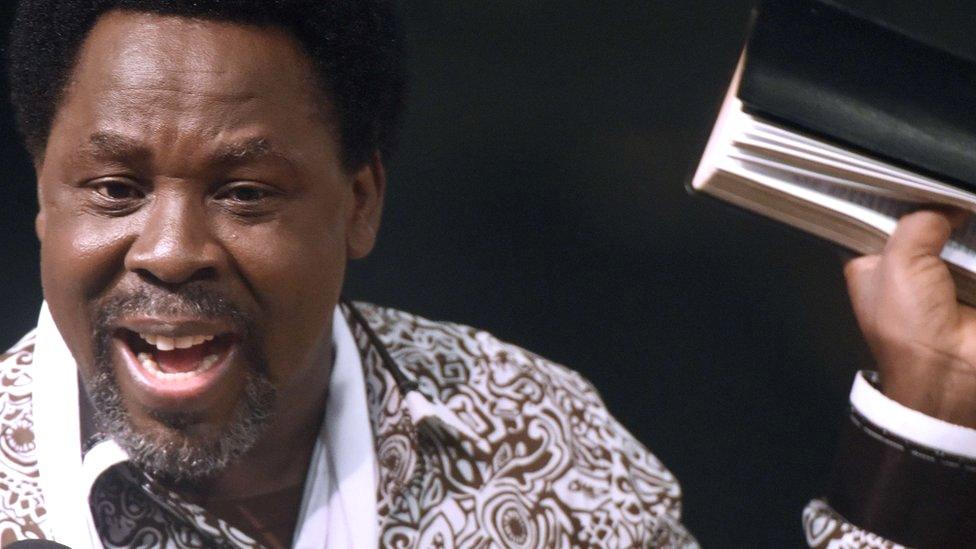
TB Joshua was hugely influential in Nigeria - and across the world
Some 50,000 people would attend Joshua's services every week, and the church became a top site for foreign visitors to Nigeria. His global television and social media empire was among the most successful Christian networks in the world, with millions of viewers spanning Europe, the Americas, South East Asia and Africa. His YouTube channel had hundreds of millions of views.
The church is still popular today, led by his widow Evelyn and a new team of disciples.
An interview with Nelson Mandela's daughter in 2013 shows a portrait of Joshua sitting on the former president of South Africa's desk. In his lifetime, Joshua attracted dozens of politicians and celebrities to his church, including sporting legends such as Chelsea FC striker Didier Drogba and at least nine African presidents.

For support and information on sexual abuse, please consult this BBC Actionline within the UK. And for more information on cults, please see The Family Survival Trust, external

Many of his followers were drawn by his philanthropy, but most came for his so-called miracles. Joshua systematically filmed spectacular "healings" throughout his career. After Joshua prayed for them, individuals on camera testified to being cured of ailments ranging from cancer and HIV/Aids, to chronic migraines and blindness.
"We'd never… seen anything like that before," says Solomon Ashoms, a journalist who covers African religion.
"The mysteries that he had, the secrets that he carried, [were] what people followed."
A number of Joshua's videos show men with severely infected genitals, which burst open and then miraculously heal when he raises his arm in prayer. Others show women struggling to give birth, who instantaneously deliver their children when Joshua approaches. After each event, those involved would testify to being saved.
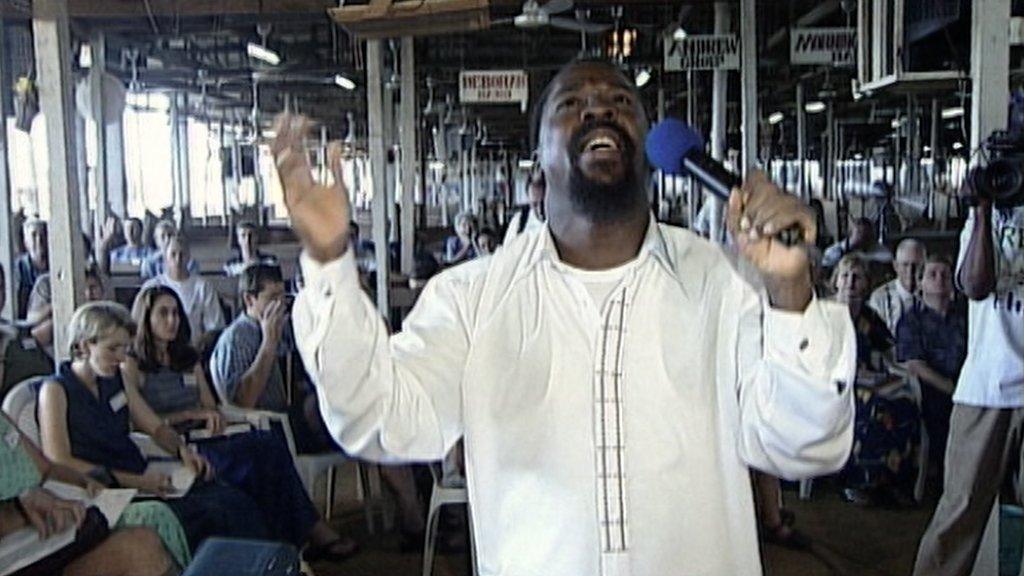
TB Joshua deliberately courted Westerners to market his brand, former insiders say
Video tapes of Joshua's healings were circulating among evangelical churches throughout Europe and Africa in the late 1990s and early 2000s.
Rae, who had grown up with conservative Christian values, was inspired to travel to Lagos after watching these videos, shown to her by a South African acquaintance.
"I was gay and I didn't want to be," she says. "I thought: 'Well, maybe this is the answer to my problems. Maybe this man can straighten me out. Like if he prays for me, I won't be gay any more.'"
Another British woman, Anneka, from Derby, in the Midlands, says she was also entranced by the videos.
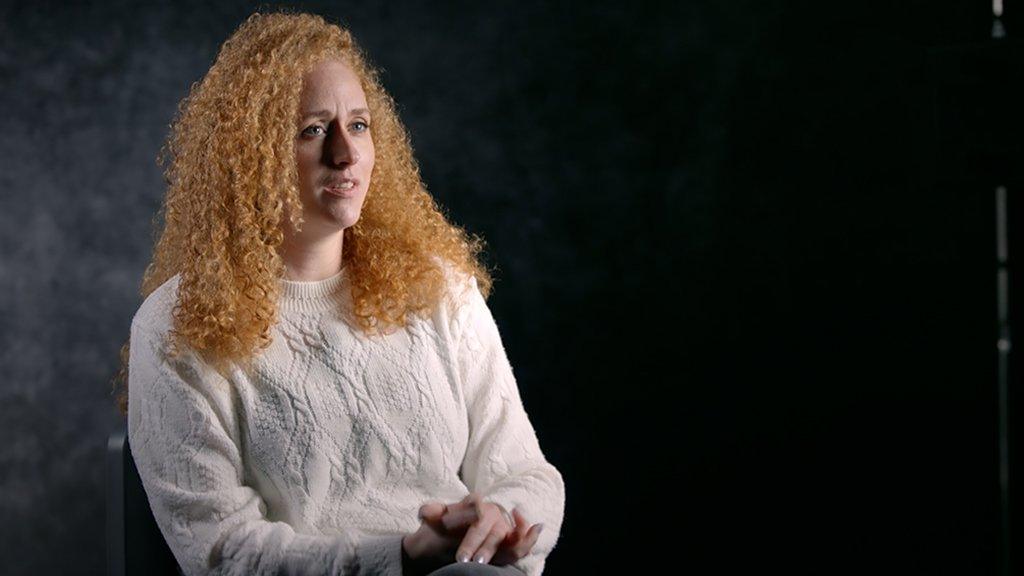
Anneka says the videos of Joshua's "miracles" compelled her to travel to Nigeria - and join the church
"The whole room went completely still," she says, describing the moment her church congregation first encountered the tapes when she was 16.
"This is what Jesus would have done," she remembers thinking. She, too, went on to travel to Nigeria.
Neither Rae nor Anneka, nor many of the young people who left their home countries to meet Joshua in the early 2000s, paid for their tickets. Church groups across England raised funds to send pilgrims to Lagos to witness these miracles - and Joshua contributed Scoan money himself, senior former church insiders say. Later, once the church was well established, he charged high prices for pilgrims to come and stay.
Bisola, a Nigerian who spent 14 years inside the compound, says courting Westerners was a key tactic.
"He used the white people to market his brand," she says.
Former insiders estimate Joshua made tens of millions of dollars from pilgrims and other money streams - fundraising, video sales, and stadium appearances abroad. He rose from poverty to become one of Africa's richest pastors.
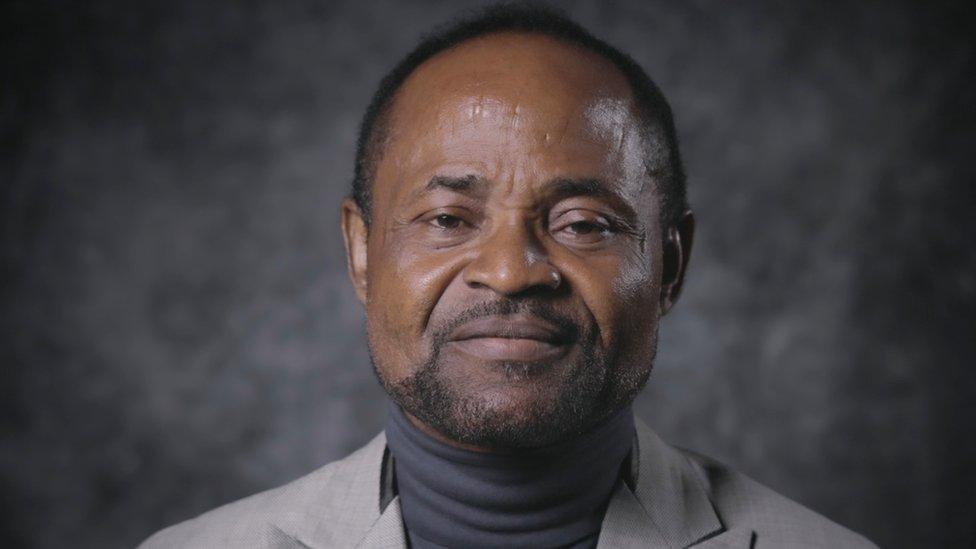
Agomoh Paul says he was in charge of the "miracles" production
"That guy [was] a genius," says Agomoh Paul, a man once regarded as Joshua's number two in the church, who left after 10 years in the compound.
"Everything… [he did was] planned out."
A major part of this planning was the faking of the "miracles" says Agomoh Paul, which he says he oversaw.
He and other sources say that those "cured" had often been paid to perform or exaggerate their symptoms before their supposed healing took place. In some cases, they say, people had been unknowingly drugged or given medicine to improve their conditions while at the church, and later persuaded to give testimony about their recovery. Others were falsely told they had tested positive for HIV/Aids and that, thanks to Joshua's ministrations, they had now become virus-free.
When Rae landed in the seething heat of Lagos, she saw miracles too. Dozens of people came and testified to having been healed of serious illnesses.
"I had a really involuntary reaction. I just broke down in floods of tears," she says.
It was then that Rae was chosen. Joshua singled her out to become a "disciple" - an elite group of followers who served him and lived with him inside his compound.
Rae thought she was going to study under Joshua, to "cure" her sexuality, to learn how to heal people.
The reality was very different.
"We all thought we were in heaven, but we were in hell," she says. "And in hell terrible things happen."

Disciples: The Cult of TB Joshua
A shocking journey into a maze of manipulation and terrifying abuse perpetrated by one of the most powerful religious figures of the 21st Century
Watch now on BBC iPlayer (UK only) or on the BBC Africa YouTube channel (outside UK), external


World of Secrets - The Disciples
A nine-episode season - a shocking journey into a maze of manipulation and terrifying abuse

Sixteen of the former disciples we interviewed, including Rae, provided first-hand testimony of sexual assault or rape by Joshua. Many say it happened frequently - as much as two to four times a week - for the duration of their time in the compound. Some described violent rapes which left them struggling to breath or bleeding.
Many believed they were the only ones being assaulted and did not dare share what was happening to them with the other disciples, as they were all encouraged to report on each other.
According to Victoria, who asked us to change her name for safety reasons, and who spent more than five years in the compound, other sexual assault victims were often hand picked by Joshua from the church congregation.
She says she was picked out while attending the church's Sunday school, and says she was raped in Joshua's private quarters a few months later, after her parents entrusted her into his care. She was then recruited as a resident disciple.
Victoria says Joshua ordered some of his most trusted Nigerian disciples to help identify new victims. The group was informally known as the "fishing department" and she says it ultimately coerced her into joining.
Another disciple involved in similar recruitment was Bisola.
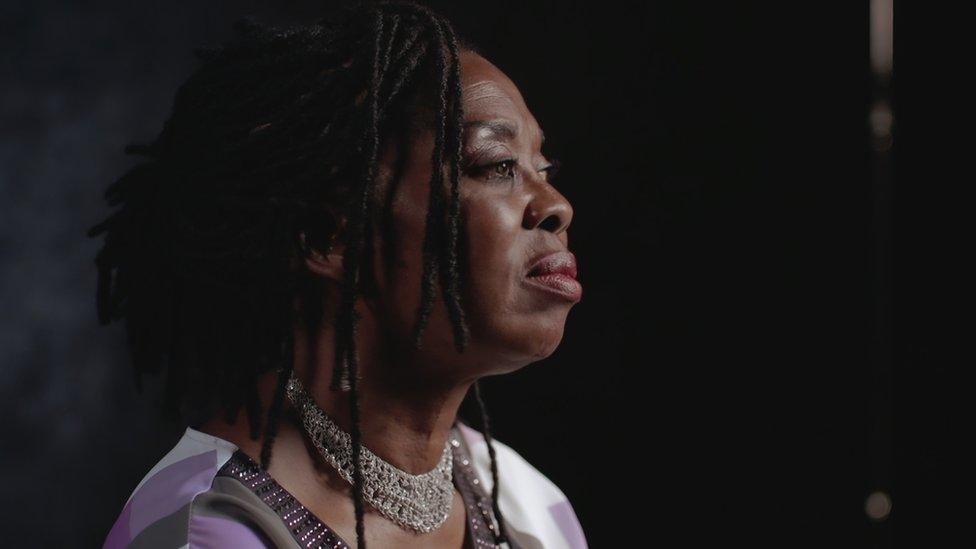
Bisola says she was forced by Joshua to select young women for him to abuse
"TB Joshua asked me to recruit virgins for him… So that he could bring them into the disciple-fold and disvirgin them," she says.
She participated because of both "indoctrination" and threats of violence, she says, adding she herself was repeatedly raped by Joshua.
A number of women say they were under the age of legal of consent - which is 18 in Lagos state - when they were sexually assaulted or raped. This offence can lead to the death penalty in Nigeria.
Jessica Kaimu, now a broadcast journalist in Namibia, says she was just 17 and a virgin when Joshua raped her in the bathroom of his penthouse, within weeks of her becoming a disciple.
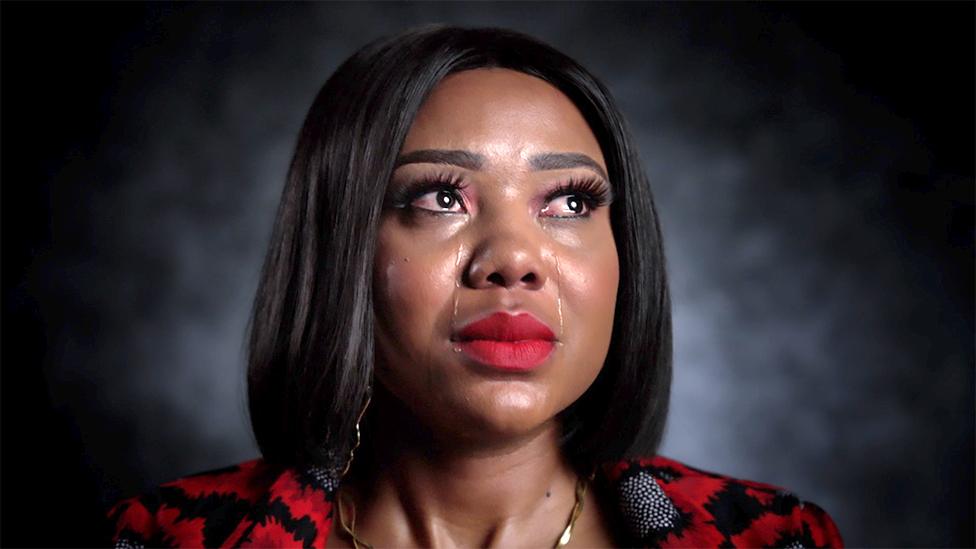
Jessica Kaimu says she was repeatedly raped by TB Joshua
"I was screaming and he was whispering in my ear that I should stop acting like a baby… I was so traumatised, I couldn't cry," she says.
Jessica says this encounter was repeated again and again, throughout the five years she spent as a disciple. Her account mirrors that of other women who spoke to the BBC, and also of accounts by four of Joshua's male personal servants who were given the job of clearing up the physical evidence of this abuse.
Many of the details of our interviewees' accounts are too graphic to publish. They include multiple first-hand accounts of women being stripped naked, and raped with objects - including one woman who says it happened to her twice before the age of 15.
"It was so painful, he violated me," the woman, who asked to remain anonymous, says. "Words cannot properly express it. It scarred me for life."
A number of interviewees who say they were raped and became pregnant by Joshua, explain how they were also then given forced abortions inside the compound - in an area known as the "medical department" or "clinic".
"It would all be done in secrecy," says Sihle, a South African former disciple, who says she had three forced abortions in the church.
"You are given a concoction to drink and you get sick. Or they put these metal pieces in your vagina and they extract whatever. And you don't know whether they're [accidentally] pulling out your womb."
Sihle wept throughout her interview, as did Jessica who says she was given five forced abortions.
Bisola says she witnessed "dozens" of abortions during her 14 years inside the church. At times, she says she would climb to the highest floor of the compound and cry, begging God to save her.

The disciples served Joshua's every need. They gave him massages, helped him dress, sprayed perfume when he entered the room. They placed plastic gloves on his hands so he could eat his food without touching a crumb.
Rather than call him by his name, they were all encouraged to address him as "Daddy". It's not uncommon for a Nigerian pastor in the Pentecostal tradition to be addressed this way, but the disciples say it was a term Joshua insisted on.
"My mind was like it had been shaken," says Anneka. "There was no cognitive clarity at all... Reality was skewed completely."
The physical design of the compound deepened their disorientation.
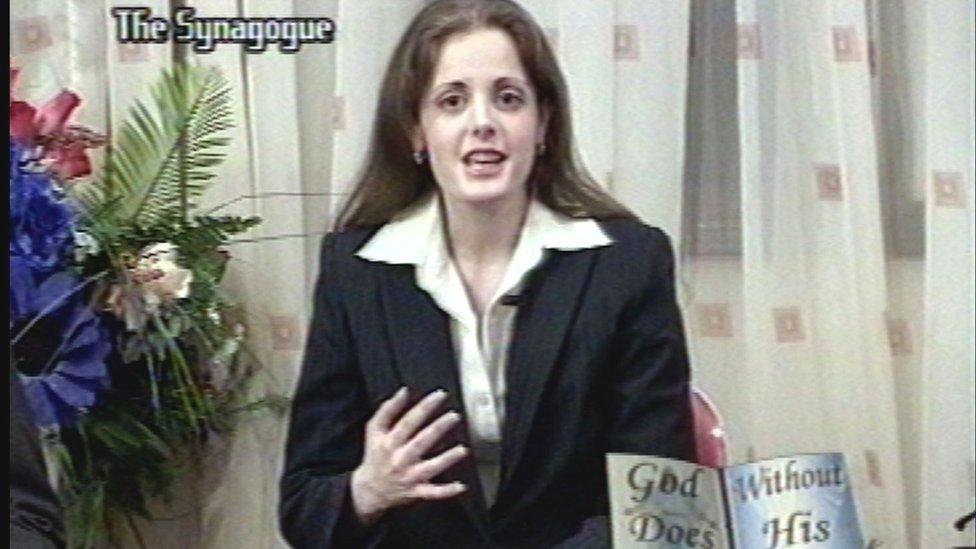
Rae proselytising for Synagogue Church of all Nations in one of their broadcasts - the disciples say they worked unpaid for the church for long hours each day
"It was a maze of staircases," says Rae.
In 2014, the construction cost lives. A six-storey guest house built for international guests collapsed, killing at least 116 people.
A subsequent local government report found structural failure and shoddy building work to be the cause of the collapse. No-one has ever been prosecuted.
Some of our interviewees told us they believe the death toll was significantly higher than reported, explaining that a number of Nigerian nationals who had been working on the guesthouse were not listed as victims, and that church members had botched rescue attempts and hidden bodies at night.
They say Joshua also prevented the emergency services from assisting rescue efforts in the immediate aftermath, ever aware of his public profile.
His grip on communication was always tight, our sources say.
Rae says it was only after she left that she realised that her family and friends had been sending her emails. She had never received them.
Joshua restricted disciples' access to phones and email accounts, our interviewees say.
"He wanted to control everybody, everything," says Agomoh Paul. "What he was really scrambling for [was] the control of people's minds."
The disciples say they were made to work, without pay, for long hours each day - running all aspects of the megachurch. All say sleep deprivation was routine, with lights left on in the dormitories at night.
Anneka says they never had more than four hours of sleep at a time.
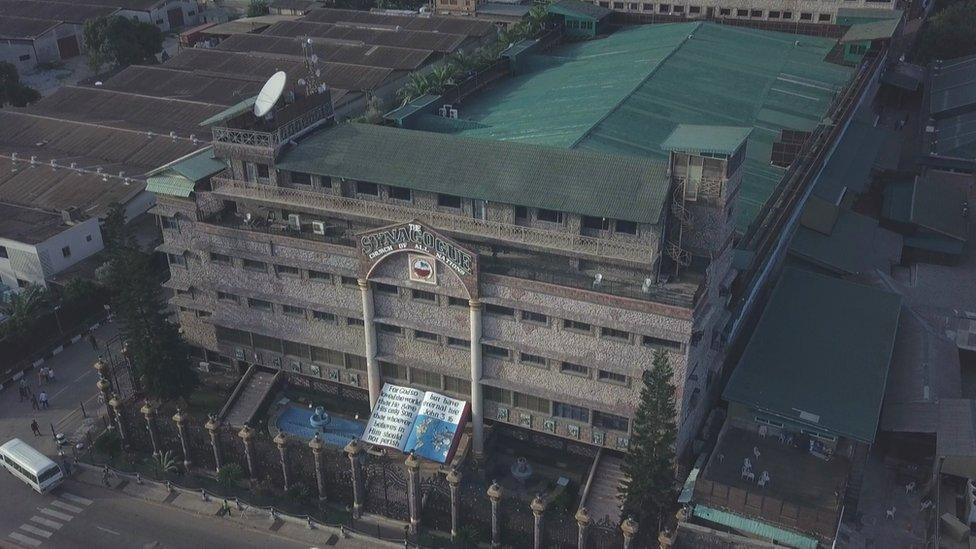
Scoan continues to thrive today, under the leadership of Joshua's widow, Evelyn
If anyone was caught napping without permission, or contravening any other of Joshua's rules, they would be punished. Nineteen former disciples described witnessing violent attacks or torture within the compound, carried out by Joshua or on his orders.
Other disciples described being stripped and whipped themselves, with electrical cables and a horse whip known as a koboko. Among those allegedly targeted in this way were trainee disciples as young as seven.
The compound in Lagos had 12ft-high [3.7m] walls and armed guards. But what really kept the disciples there was the fanatical loyalty he generated, and deep-rooted fears instilled by Joshua about what might happen to them if they did escape.
"It was a psychological prison," says Rae. "It's extremely difficult to understand how somebody can go through psychological abuse to the extent that they lose their critical thinking."
"Scoan fits the definition of a cult rather precisely," says Dr Alexandra Stein, an honorary fellow at the University of Sussex and member of The Family Survival Trust, which raises public awareness of cult groups.
She has encountered multiple Scoan survivors, and says Joshua isolated his victims, putting them through "coercively controlling processes of stress, fear, guilt and shame". She adds this meant they became too frightened to leave.
All the BBC interviewees spoke of "brainwashing", "indoctrination" and "mind control" - and many described life as a disciple under Joshua as like being in a "cult".
Rae says for her, it is the psychological torture that has left the deepest scars. She says Joshua subjected her to a form of punishment known as "adaba" for two years, during which she was forbidden from leaving the compound, and nobody inside was allowed to talk to her.
"I was basically in total isolation… I had a complete breakdown," she says. "I tried to commit suicide five times."
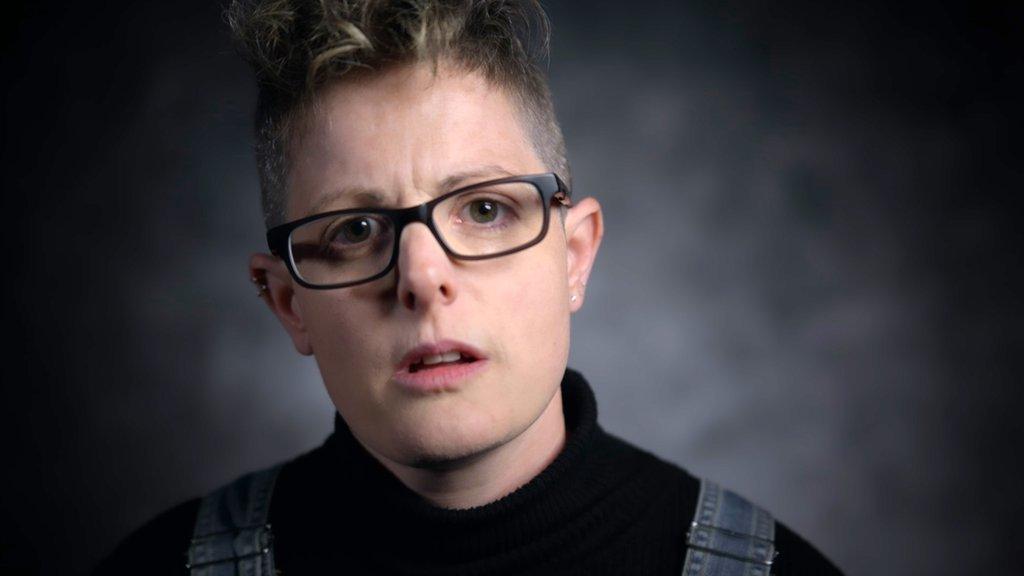
Rae is now back in the UK after 12 years in the Scoan compound
In being pushed to the brink, something cracked in Rae's mind. Twelve years of indoctrination began to unravel.
"He made a huge mistake, he lost control of me," she says.
While travelling with the church on a tour to Mexico, Rae slipped away from the disciples. She never went back.
Her life is now very different. But she has to live with the disappointment that there is no way to hold Joshua to account.
"TB Joshua dying before facing justice for the atrocities he committed, has been deeply frustrating. It's only added to the gross sense of injustice felt by all of us as his victims."
We contacted Scoan with the allegations in our investigation. They did not respond to them, but denied previous claims against TB Joshua.
"Making unfounded allegations against Prophet TB Joshua is not a new occurrence… None of the allegations was ever substantiated," they wrote.
Additional reporting by Maggie Andresen, Yemisi Adegoke and Ines Ward

Are you personally affected by the issues raised in this story? Share your experiences by emailing haveyoursay@bbc.co.uk, external.
Please include a contact number if you are willing to speak to a BBC journalist. You can also get in touch in the following ways:
WhatsApp: +44 7756 165803
Tweet: @BBC_HaveYourSay, external
Please read our terms & conditions and privacy policy
If you are reading this page and can't see the form you will need to visit the mobile version of the BBC website to submit your question or comment or you can email us at HaveYourSay@bbc.co.uk, external. Please include your name, age and location with any submission.
- Published8 January 2024
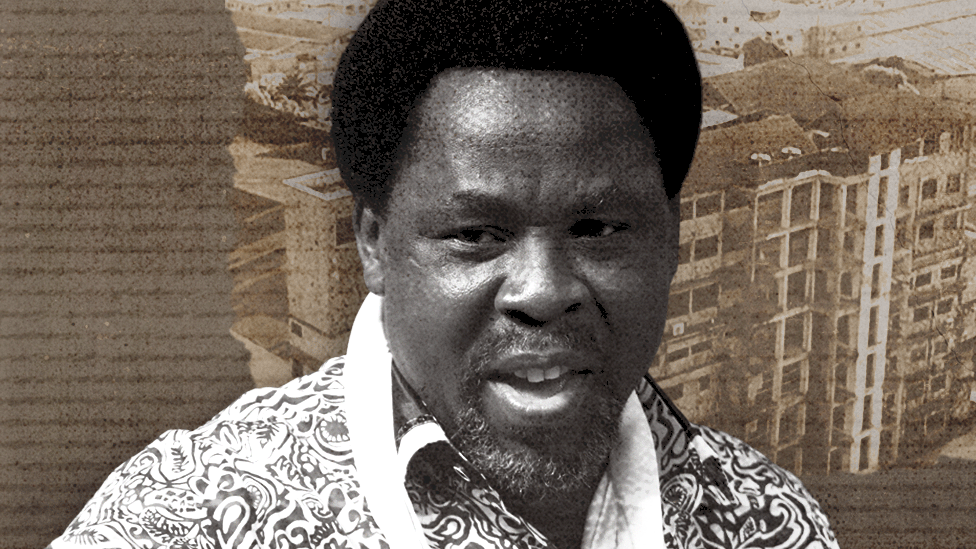
- Published8 January 2024
